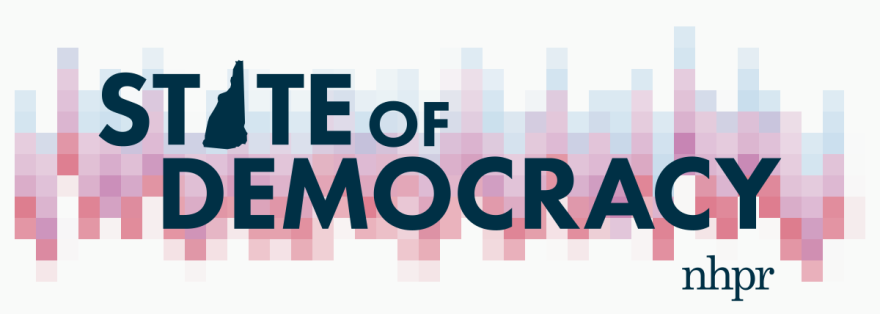Rep. Bob Backus of Manchester said he thought Tuesday morning's anti-harassment training for legislators was worthwhile — even if, he conceded, he might not have absorbed the whole thing.
“I wasn’t fully awake and participating very well,” Backus, a Democrat, said in the hallway after the 8:30 a.m. presentation wrapped up.
In any case, Backus was there. And that was more than most of his colleagues could say.
Only about 40 — or 10 percent of New Hampshire’s 424 legislators — showed up for the official training on the State House’s anti-harassment policy Tuesday morning. Some lawmakers said they had scheduling conflicts, but others dismissed it as a poor use of time.

"I don't need to be told by someone that sexual harassment or assault is wrong," tweeted Rep. Brian Stone, a Northwood Republican. "I was in the Army for [eight] years. I had these classes every month.”
House Chief of Staff Terry Pfaff said he and other leaders couldn’t force legislators to attend, much like State House officials have said they can’t force members to sign a form acknowledging they read the anti-harassment policy.
Those who weren’t there for Tuesday’s training in person are being encouraged to review an online version on their own time.
“It’s the principal officers, the Speaker and the President trying to push this along to make sure that they know it’s a new world that we live in,” Pfaff said. “They’re all elected people, they’re all leaders in the political world, and we want them to illustrate that by being on the right cutting edge, the right side of this issue.”
While this isn’t the first time this kind of lesson’s been offered to lawmakers, it’s the first one to happen in the so-called “#MeToo era" — which has brought heightened attention on the issue of workplace harassment in state legislatures across the country, including New Hampshire.
Led by top officials with the attorney general’s office and the state’s employee assistance program, the latest iteration of the training covered a lot of ground: everything from offensive jokes in the break room to sexting and social media posts.
“Whatever you have in your office has to be OK with the environment,” State Employee Assistance Director Paula Booth said, offering one of many examples of scenarios that would cross a line at the State House. “So if you’re downloading porn, looking at porn, on your own equipment, that’s still not appropriate in the workplace.”
The trainers also made a point of noting what kind of preventative approaches would be more harmful than helpful. Associate Attorney General Anne Edwards pointed out that some men have suggested avoiding one-on-one meetings with women is the answer.
“As you read articles, what a lot of the different companies in Hollywood have said is that well we’re not going to take women out for drinks anymore,” Edwards said. “We’re not going to take women out for dinner. We’re not going to have those type of business meetings anymore with women. We’re just going to have strictly meetings in the office.”
But that kind of response, Edwards said, is actually “a discriminatory act in and of itself.”
Some female lobbyists and lawmakers recently told NHPR that they’ve hesitated to confront lawmakers about inappropriate behavior in the past precisely because they feared that doing so would cost them valuable professional access.
Another theme stressed repeatedly during the program: Lawmakers can’t count on history as a guide for what’s inappropriate in today’s workplace. Rep. Jackie Cali-Pitts, a Portsmouth Democrat who’s been in the House for more than two decades, took that message to heart.
“In Hollywood, there was always the casting couch. Here, things were done behind closed doors,” she recalled. “I remember when I first came here as a freshman, ‘You’ll never go anywhere because you don’t have the wardrobe.’ You know? And that kind of prevailed. ‘You don’t fit in the mold.’ Well, I think women today are saying we don’t want to fit in the mold.”
But the remnants of that old line of thinking can still be found on the wall of the State House today.

In the antechamber of Representatives’ Hall, right next to the room where the harassment training was taking place, there’s a framed poem taken from a 1980s-era House journal called “The Great Men On the Wall.”
It talks with reverence about portraits of past leaders hanging around the State House, and imagines what they’d think of the institution today. An excerpt:
Spoke up John Hale, Senator from the days of yore, 'They've changed so much on manner, speech and dress They question, they bicker, they argue up a storm I admire them all, especially the lovely lady legislators In their mini-skirts and slacks. Gad, what forms!'
Pfaff, the House chief of staff, said he didn’t notice the poem until reporters pointed it out Tuesday and wasn’t sure how it got up on the wall in the first place, but “we’re going to have to revisit that.”
Manchester Rep. Amanda Bouldin, a Democrat who attended Tuesday’s training, was also surprised it hadn’t elicited more discussion before.
“It seems to be dated 1989, which seems a little late to be writing a poem like that,” Bouldin said. “I mean, if we’re going to be talking about history...”
At the New Hampshire State House, history only moves so quickly.








